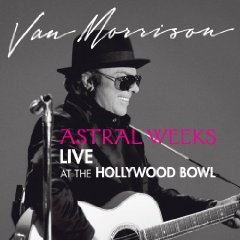I stabbed Van Morrison in the back. But he asked for it.
What I did was the obvious: I listened to the Belfast soul man’s 1968 landmark “Astral Weeks.” On grungy old vinyl. AFTER I had listened to the live CD of “Astral Weeks” that he recorded last year at the Hollywood Bowl.
It was not a fair comparison. Morrison knows that, which is one of the reasons he has resisted nostalgia so consistently: Any artist (or athlete, writer, hooker) finds his stiffest competition in his younger self. Some think Morrison revisited “Astral Weeks” for the paycheck, but no; facing down his own legend took guts, and he must have felt he could battle himself to a draw. At least.
Everything’s changed, not least Morrison. Just look at him on the “Live” cover, in hat, shades and upturned collar -- he looks like a spy, making every effort to conceal himself, letting us know that his feelings are not the point. And his approach to the material is that of a mature, extremely skilled musician who wants to be appreciated as such. The way he’s done for decades, he uses his darkened yet effortlessly leaping voice like a jazz saxophone on an abstractionist mission. The words, which he has usually treated as vehicles for suggestion rather than for specific communication, have now shrunk to little more than syllables to be shaded, chopped, drawn out, tossed around with virtuosic élan.
Morrison even makes a point of disdaining his old verbal efforts. On the jazzbluesy, almost ragalike new rendition of “Ballerina,” he randomly decides to grunt and growl the words “The light is on the left side of your head,” inciting the audience to howl as if he’s made some smutty joke. The joke’s on them; they should’ve been paying more attention when, amid the ecstatic meadow stroll of “Beside You,” he wailed, “Never never never wonder why.”
But we can’t stop wondering. Why, for instance, does Morrison have the lyric sheet to the classic pipe dream “Madame George” refer exclusively to “Madame Joy,” and why does he slur the name to ambiguity? Why does he re-ballast the coda of that song (resequenced to conclude this “Astral Weeks” journey) so it ends with insistent repetitions of the phrases “This is a train” and “Get on the train”? Guess: He wants to say this is a scenic ride, not an emotional trip, and sorry, we’re about to pull into the station, won’t be going that way again. On the mantralike leadoff title track, one of the new lyrics (printed boldly on the cover) boasts that Morrison believes he has transcended time. Maybe so, and in the process he has transcended meaning.
Which he does with a master’s touch, bringing his musicians gladly along. The gamboling violin-viola riff and strummy waltz rhythm of “Sweet Thing” communicate real joy. “Slim Slow Slider” (moved to the third slot instead of the last to downplay its “I know you’re dying” message) treats us to crazy improvisations amid the sad, can-kicking ruminations. The genius of blending blues with harpsichord shines through on “Cypress Avenue.”
Amid a dozen sensitive and deferential accompanists, one stands out: the sole returnee from ’68, guitarist Jay Berliner. He sounds just ecstatic to be on board -- bending and buzz-picking his nylon strings, throwing in jazzy obbligatos all over the place. He’s exactly the foil needed for this project, and the project can only be called a beautiful success.
I eagerly await the DVD. The album -- which includes a couple of fine bonus tracks, “Listen to the Lion” and “Common One” -- is also available on double LP, which might be a good way to go. Morrison got what he wanted, and what he wanted is very special. At least it is until you compare it to the original. And that backstab is inevitable.
Morrison was barely 23 in 1968, when he opened his guitar case in that New York studio. After he’d walked through fire with his old label, Bang, the Warner folks had set him free with a band that included Modern Jazz Quartet drummer Connie Kay, Charles Mingus guitarist Berliner, and Eric Dolphy bassist Richard Davis. Morrison sang his pain and his wonder with the clear articulation of a young, natural, almost naive voice. The music wandered where it would. And the hand of God blessed the labors of man.
The original “Astral Weeks” is the mystic church, the slipstream, the breath that makes you high. It could never be repeated.

